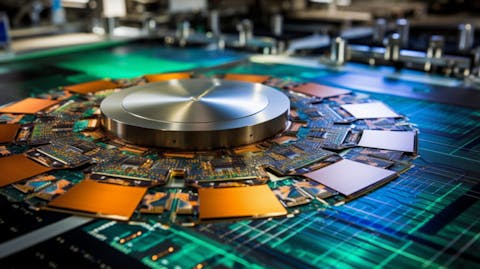We came across a bullish thesis on Taiwan Semiconductor Manufacturing Company Limited (TSM) on Substack by Rihard Jarc. In this article, we will summarize the bulls’ thesis on TSM. Taiwan Semiconductor Manufacturing Company Limited (TSM)’s share was trading at $166 as of March 31st. TSM’s trailing and forward P/E were 24.32 and 18.80 respectively according to Yahoo Finance.

A close-up of a state-of-the-art semiconductor wafer foundry.
TSMC is the undisputed leader in the semiconductor foundry industry, dominating advanced node manufacturing with an unmatched technological edge and a highly diversified revenue base. The company’s key revenue drivers span High-Performance Computing (HPC), Smartphones, IoT, Automotive, and Digital Consumer Electronics. While smartphones historically accounted for the largest share, HPC has overtaken it, driven by surging demand for AI accelerators. Morgan Stanley projects AI-driven cloud demand will contribute 34% of TSMC’s revenue by 2027, with additional upside potential from AI-powered smartphones triggering an upgrade cycle. Automotive, though a smaller segment, is poised for substantial growth as EVs and autonomous vehicles increasingly rely on advanced semiconductors.
TSMC’s dominance is rooted in its unparalleled execution, strict manufacturing discipline, and customer-centric approach. Unlike Intel, which balances both chip design and fabrication, TSMC focuses exclusively on manufacturing, allowing it to refine processes, optimize costs, and ramp up production yields with unmatched efficiency. This specialization has made it the preferred partner for semiconductor giants like Nvidia, Apple, and AMD. The company’s ability to execute flawlessly is a key differentiator—while Intel has suffered repeated delays in process node transitions, TSMC consistently delivers on schedule, reinforcing trust among customers. Even at mature nodes, TSMC sustains profitability through manufacturing refinements and economies of scale.
Data security and proprietary optimizations further enhance TSMC’s moat. Unlike competitors that rely on third-party vendors for process control, TSMC develops in-house AI-driven optimization systems, ensuring that critical manufacturing data remains under its control. Equipment suppliers like ASML and Applied Materials must operate within TSMC’s stringent security framework, giving the company a unique advantage in fine-tuning its processes. This allows TSMC to improve yields faster than rivals, a critical factor in semiconductor manufacturing where cost efficiency and scale determine market leadership.
TSMC’s customer-centric philosophy is another pillar of its success. Rather than imposing rigid design constraints on clients, as Intel historically did, TSMC embraced a collaborative model, working closely with EDA tool providers like Cadence and Synopsys. This flexibility attracted a broad customer base, from emerging startups to established leaders like Nvidia, which started as a small client but has since grown into one of TSMC’s most significant customers. By fostering long-term relationships and treating all clients as strategic partners, TSMC has solidified its position as the foundry of choice for semiconductor innovation.
One of the best examples of TSMC’s strategic decision-making is its transistor roadmap. While Samsung rushed to implement Gate-All-Around (GAA) transistors at 3nm, TSMC opted to refine its FinFET process, prioritizing stability and yield over marketing-driven technological shifts. This pragmatic approach ensured that customers could transition to new nodes seamlessly, reinforcing TSMC’s reputation for reliability. The company’s conservative yet highly effective technology rollouts underscore why it continues to outpace rivals in both execution and market trust.
Looking ahead, TSMC is positioned to capitalize on multiple secular growth drivers, including AI, automotive chips, and advanced packaging. With AI demand skyrocketing, the company’s cutting-edge capacity is in high demand, with Nvidia, AMD, and cloud providers aggressively securing production slots. The increasing semiconductor content in vehicles provides another tailwind, benefiting TSMC’s mature nodes, while its advanced packaging solutions, such as CoWoS, are becoming critical for high-performance computing applications. Geopolitical risks remain a concern due to TSMC’s Taiwan base, but the company is mitigating supply chain vulnerabilities through expansion into the U.S. and Japan, ensuring operational resilience.
Despite its dominant industry position, TSMC’s stock remains attractively valued, trading at a market cap of $740 billion on the Taiwan Stock Exchange ($857 billion via U.S. ADRs at a 15.8% premium). The company’s current valuation—9.29x EV/EBITDA and 15.88x forward P/E—sits at the lower end of its historical range, only dipping lower during extreme market dislocations like the 2022 tech selloff and the 2020 COVID crash. In contrast to many AI-related stocks trading at stretched multiples, TSMC provides direct exposure to the AI boom at a reasonable valuation.
With AI-driven demand accelerating, TSMC’s CFO has reiterated a “close to 20%” revenue CAGR projection over the next five years, while AI semiconductor demand for cloud applications is expected to grow at an even more staggering 40%+ CAGR. This trajectory, coupled with TSMC’s strong execution, positions the company as the backbone of the semiconductor industry. Unlike traditional chip cycles that are often dictated by consumer electronics trends, AI-driven semiconductor demand is structural, extending across cloud data centers, edge computing, and automotive applications.
The ongoing shift from AI model training to inference is also expanding TSMC’s total addressable market. As OpenAI, Groq, and Google’s Gemini face chip shortages, AI infrastructure investments are surging, further cementing TSMC’s indispensable role in the ecosystem. The rise of more efficient AI models, such as DeepSeek, could also drive broader AI adoption, increasing semiconductor intensity across industries. Given these factors, TSMC’s current valuation presents an intriguing opportunity, offering investors exposure to one of the most transformative technological shifts of the decade while maintaining a reasonable risk/reward balance.
Taiwan Semiconductor Manufacturing Company Limited (TSM) is on our list of the 30 Most Popular Stocks Among Hedge Funds. As per our database, 186 hedge fund portfolios held TSM at the end of the fourth quarter which was 158 in the previous quarter. While we acknowledge the risk and potential of TSM as an investment, our conviction lies in the belief that some AI stocks hold greater promise for delivering higher returns, and doing so within a shorter timeframe. If you are looking for an AI stock that is more promising than TSM but that trades at less than 5 times its earnings, check out our report about the cheapest AI stock.
READ NEXT: 8 Best Wide Moat Stocks to Buy Now and 30 Most Important AI Stocks According to BlackRock.
Disclosure: None. This article was originally published at Insider Monkey.





